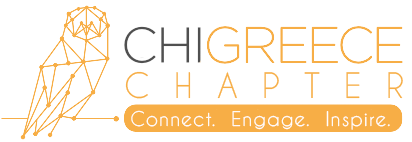Scope and Objectives
The aim of CHIGreece 2023 is to bring together researchers and practitioners working in the areas of HCI for sharing their latest results and experiences. More specifically, the conference aims at addressing the following objectives:
- Explore state-of-the-art and new implicit and explicit methods and techniques of theoretical and applied modeling of the users, human factors and behaviors in HCI
- Explore HCI techniques, computational intelligence algorithms, recommendation models, and real-time paradigms that can improve the efficiency and effectiveness of human-computer communication;
- Compare challenges and experience in different real world contexts and applications (e.g., decision support, learning, wellbeing, security), where a holistic view on HCI aspects is needed to provide a positive user experience; and
- Identify theoretical and computational models for the design, development and evaluation of HCI concepts and paradigms
We expect to offer a vibrant venue of engagement and collaboration for researchers and practitioners in the field of human-computer interaction (HCI) to showcase their work and share their experiences and new ideas for long-term sustainable HCI.
Thematic Areas
We are not confining to particular topics for the conference, although we anticipate gathering papers that address challenging and innovative topics in Human-Computer Interaction theory, methodology and practice, including but are not limited to:
- HCI and education
- HCI and digital heritage
- HCI in Virtual, Augmented and Mixed Reality
- Mobile HCI
- HCI and Adaptation & Personalization
- HCI and Accessibility & Assistive Technologies
- HCI in the Pandemic
- HCI in Business
- HCI and design
- HCI and games
- Natural HCI
- HCI and Social Media & Networks
- HCI and Interactive Entertainment
- Human-AI Interaction and Explainability
- Understanding users and human behaviour
- HCI and Privacy & Security
- HCI and Trust & Fairness
- Methodologies for HCI
- Evaluation of usability, accessibility and user experience(UX)
Type of Papers
In CHIGreece 2023 we encourage original and relevant contributions focusing on experiences and lessons learned from real-life applications, current state-of-the-art methodologies, challenges tackled and solutions adopted, tools, algorithms, and services in the academic, public or private sector, studies, theories, techniques, and evaluation procedures that could support HCI aspects in various levels of interactive environments.
All conference papers must contain original, previously unpublished, research work adhering the four publication types:
- Full research papers: 10 pages + 4 pages max. of references, proposing original reports of new research techniques, findings, and applications clearly indicating its innovative aspects. Research procedures and technical methods should be presented in sufficient detail to ensure reproducibility, and results should be clearly communicated with the respective implications and impact.
- Short research papers: 6 pages, excluding references (the produced output after the TAPS process must be 4 pages double-column excluding references), proposing original and highly promising research or applications. Merit will be assessed in terms of originality and importance rather than maturity, extensive technical validation, and user studies.
- Exhibition & interactive experiences: Initially an extended abstract of 500 words for review from individuals and research groups also in industrial organizations, spin-offs, corporations, government institutions and public administration active in the broad field of HCI eager to share ideas, results, demonstrations, functional prototypes, installations with other HCI researchers, professionals, and stakeholders. It is a track dedicated to industry and academia, and it seeks to showcase their innovations and promote collaborations among them (upon acceptance further guidelines will be provided for the camera-ready version)
- Doctoral Consortium: 6 pages, excluding references (the produced output after the TAPS process must be 4 pages double-column excluding references), submitted by young researchers / doctoral students that want to discuss their research goals, methods, and results at an early stage in their research and receive invaluable feedback. They should highlight the following, or similar, aspects like research problem, related work, research questions, proposed approach and expected innovation, current progress and future work. In the first page, they should include their research title, name, name(s) of their supervisors and university (upon acceptance further guidelines will be provided for the camera-ready version)
All types of manuscripts should be formatted according to the new workflow for ACM publications. The templates and instructions are available here: https://www.acm.org/publications/taps/word-template-workflow. Authors should submit their papers as single-column. Please note that ACM changed its templates at the start of 2019, so please ensure that you use the new template and do not reuse an old template. The templates are available here (we strongly recommend the usage of LaTeX for the camera-ready papers to minimize the extent of reformatting):
- LaTeX (use \documentclass[manuscript,review,anonymous]{acmart} in the sample-authordraft.tex file for single-column):
https://www.acm.org/binaries/content/assets/publications/consolidated-tex-template/acmart-primary.zip - Overleaf (use \documentclass[manuscript,review,anonymous]{acmart} for single-column):
https://www.overleaf.com/latex/templates/acm-conference-proceedings-master-template/pnrfvrrdbfwt - MS Word:
https://www.acm.org/binaries/content/assets/publications/taps/acm_submission_template.docx
Submission and Review Process
CHIGreece 2023 uses a:
- Double blind review process for Full and Short papers. Authors must omit their names and affiliations from submissions, and avoid obvious identifying statements. At least three expert reviewers will ensure a high standard of quality, considering originality, significance, technical soundness, clarity of exposition, and relevance to the conferences thematic areas.
Research papers should be submitted electronically as a single PDF file through the EasyChair submission system by selecting the respective paper category: https://easychair.org/conferences/?conf=chigreece2023
- Single blind (curated) review process for Doctoral Consortium (DC) and Exhibition & interactive experiences (EIE) papers. Authors do not need to be anonymized before submission. Please use the following e-mail address for these submissions by clearly indicating as prefix in Subject the respective acronym of your submission (e.g., [DC] < Title of your paper >): chigreece@greekchi.acm.org
Accepted Full, Short and Doctoral Consortium papers will be included in the conference’s proceedings, published by ACM and will be available via the ACM Digital Library. Exhibition & interactive experiences papers will be available on the conference Web-site. At least one author of each accepted paper must register for the conference and present the paper in the conference.
